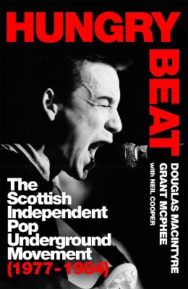‘I think the spirit of independence in today’s scene can be traced back the fervour with which Fast Product and Postcard agitated.’
Hungry Beat tracks the significant cultural contribution of two maverick Scottish independent music labels – Fast Product and Postcard. To mark its release, we speak to one of the co-authors Douglas MacIntyre to learn more about why this era of music is so seminal in Scotland’s musical history.
Hungry Beat: The Scottish Independent Pop Underground Movement (1977-1984)
By Douglas MacIntyre and Grant McPhee
Published by White Rabbit Books
The book focuses on 1977-1984 in particular – what is it about this era and music that is so significant in Scotland’s musical legacy, and more broadly?
I think the era covered in Hungry Beat is interesting from many perspectives. The emergence of Fast Product felt like Scotland’s response to punk, albeit as filter through art angles. It was an era where Scottish culture started believing in itself and took an internationalist outlook.
Can you tell us a bit more about Fast Product and Postcard, and why the two record labels are so seminal?
Fast Product was self consciously a brand before people flouted that term. The label was initiated by Bob Last, who was as interested in product packaging as he was the music (which he largely produced). To gain international attention for the groups on the label (The Mekons, The Human League, Gang of Four, Scars) was an incredible achievement.
Postcard announced itself with Orange Juice, who were heavily involved in the label along with Alan Horne. Postcard was an extremely intelligent and artistic collection of young people, and like Fast Product was driven by the energy created by punk. The groups who released records on Postcard – Orange Juice, Josef K, The Go-Betweens, Aztec Camera – crafted literary pop masterpieces.
The book is told in the people’s own words for the most part – how did you find the process of bringing together the book in this form? What do you think their stories, together, convey about how it was to be part of this amazing and thriving scene?
The book was brought together by using interviews by the active participants from the Fast Product / Postcard period. These interviews (taken from Grant McPhee’s wonderful film about these labels) formed the basis of the oral narrative that chronicles the development of the birth of the Scottish independent music scene. It was an amazingly exciting time period where art and music collided and burned brightly.
What are some stand out moments or anecdotes from the book or time period in general, for you?
I think early periods of both labels highlighted the power of youth. Hilary Morrison’s involvement as a singer in the flowers and as fast product photographer was inspirational. Whilst as Postcard, Orange Juice deployed camp rhetoric which soon had the national media flocking to them.
The music industry has evolved greatly over the years – what are some elements in today’s scene that you see as the result of the seeds planted in this era?
I think the spirit of independence in today’s scene can be traced back the fervour with which Fast Product and Postcard agitated. Both labels wrapped the London media around their fingers.
We couldn’t discuss a music book without asking for some highlights: what are your standout gigs you’ve been to over the years?
I think the standout concerts I attended during the Hungry Beat period were ‘A tribute to Frank Sinatra’ – which featured Scars, Associates, Josef K, Fire Engines – at Valentino’s in Edinburgh, and Orange Juice at the Bungalow Bar in Paisley.
What do you hope readers take from Hungry Beat?
I hope readers enjoy the book and realise what an important moment in pop culture the Fast Product / Postcard explosion was.
Hungry Beat: The Scottish Independent Pop Underground Movement (1977-1984) by Douglas MacIntyre and Grant McPhee is published by White Rabbit Books, priced £20.
ALSO IN THIS ISSUE

 Hungry Beat: A Q & A with Douglas MacIntyre
Hungry Beat: A Q & A with Douglas MacIntyre
‘I think the spirit of independence in today’s scene can be traced back the fervour with which Fast …

 New Skin For Old Ceremony: Nasim Asl Interviews Arun Sood
New Skin For Old Ceremony: Nasim Asl Interviews Arun Sood
‘I always listen to music when I’m writing.’













